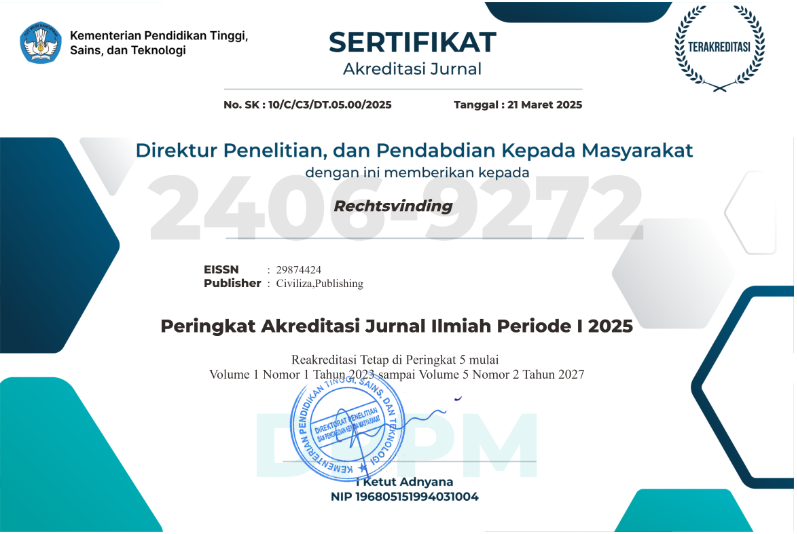Reconstruction of Marine Pollution Regulations and Control of Plastic Waste in The Indonesian Sea in The Context of Biodiversity Protection
DOI:
https://doi.org/10.59525/rechtsvinding.v3i1.840Keywords:
marine pollution; protection; plastic waste; regulation; reconstruction.Abstract
This research examines the issue of Marine Pollution in Indonesia, which is the second largest contributor of plastic waste in the world with an estimated 3.22 million tons of plastic waste entering marine waters annually. The research aims to analyze the reconstruction of regulations controlling plastic waste in the sea for the protection of biodiversity. Using a normative legal research method with statutory and conceptual approaches, this research identifies gaps in Indonesia's Marine Pollution control regulatory framework. The results show fragmentation of regulations and overlapping authority between institutions, as well as significant impacts on marine biodiversity affected by plastic waste. This research proposes a regulatory reconstruction model comprising five main strategies: harmonization of regulations through the establishment of a specific Law on Marine Pollution Control, institutional strengthening through a Marine Pollution Prevention Coordination Agency, diversification of regulatory instruments including economic instruments, law enforcement reform, and strengthening multi-stakeholder participation. Implementation of this model is expected to increase the effectiveness of plastic waste control in Indonesian seas for the protection of marine biodiversity.
References
Badan Informasi Geospasial. 2019. “Geographical Names (UNCSGN) Dan United Nations Group of Experts on Geographical Names (UNGEGN).” Ilmagi Indonesia 19(2): 1–198. https://www.dpr.go.id/dokakd/dokumen/RJ1-20190425-125010-5297.pdf.
Chotimah, Hidayat Chusnul, Muhammad Ridha Iswardhana, and Lucitania Rizky. 2022. “Model Collaborative Governance Dalam Pengelolaan Sampah Plastik Laut Guna Mewujudkan Ketahanan Maritim Di Indonesia.” Jurnal Ketahanan Nasional 27(3): 348.
Djulaeka, Dr. 2019. Buku Ajar: Metode Penelitian Hukum. ed. Devi Rahayu. Surabaya: Scopindo Media Publisher.
Junef, Muhar. 2016. “Maritime Territorial Dispute in South China Sea.” Jurnal Penelitian Hukum 19(3): 339–48.
Kurnia Hamzani, Buty, and Olly Norita Tetra. 2023. “Pengelolaan Sampah Plastik Menjadi Ecobrick Untuk Mengurangi Laju Pencemaran Mikroplastik Di Kelurahan Kampuang Jua Kota Padang.” Jurnal Hilirisasi IPTEKS 6(3): 2023. http://hilirisasi.lppm.unand.ac.id/.
Marzuki, Peter Machmudz. 2022. “The Essence of Legal Research Is to Resolve Legal Problems.” Yuridika 37(1): 37–58.
Masdin. 2016. “Implementasi Ketentuan-Ketentuan United Nations Convention on The Law of The Sea (UNCLOS) 1982 Terhadap Perlindungan Dan Pelestarian Lingkungan Laut Di Indonesia.” Jurnal Ilmu Hukum Legal Opinion 4: 1–13. https://www.neliti.com/id/publications/152580/implementasi-ketentuan-ketentuan-united-nations-convention-on-the-law-of-the-sea.
Rahmayani, Chanidia Ari, and Aminah Aminah. 2021. “Efektivitas Pengendalian Sampah Plastik Untuk Mendukung Kelestarian Lingkungan Hidup Di Kota Semarang.” Jurnal Pembangunan Hukum Indonesia 3(1): 18–33.
Sucitra, I. D., M. H. Pratiknjo, and E. J. Kawung. 2024. “GOVERNANCE: Jurnal Ilmiah Kajian Politik Lokal Dan Pembangunan.” GOVERNANCE: Jurnal Ilmiah Kajian Politik Lokal dan Pembangunan 10(3): 67–68.
World Bank. 2021. “Laut Untuk Kesejahteraan: Reformasi Untuk Ekonomi Biru Di Indonesia.” : 72. https://www.worldbank.org/in/news/press-release/2021/03/25/sustainable-ocean-economy-key-for-indonesia-prosperity.
Yolanda, Ismi Rania, and Acwin Hendra Saputra. 2021. “Penerapan Kebijakan Ekstensifikasi Barang Kena Cukai Terhadap Produk Plastik Di Indonesia.” Jurnal Perspektif Bea Dan Cukai 5(2): 290–305.
Downloads
Published
How to Cite
Issue
Section
License
Copyright (c) 2025 Ema Nurhayati

This work is licensed under a Creative Commons Attribution 4.0 International License.








